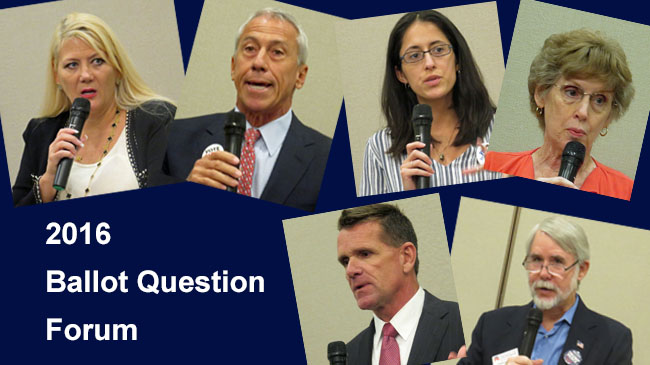
Ballot Amendments Discussed at October Lunch
Clear differences of opinion were expressed by our speakers at the 2016 Ballot Question Forum, hopefully providing the information needed to cast a vote for all the right reasons.

Clockwise from upper left: Cindy Tindell, Richard Pinsky, Bianca Garza, Virginia Brooks, Fred Scheibl, Bill Perry
Kicked off by moderator Fred Scheibl, who gave an overview of the questions and drilled down on amendments 3 and 5, we had pro and con speakers for the solar amendment (1), medical marijuana (2) and the county sales tax increase.
Amendment 3, which adds totally and permanently disabled first responders to the list of groups getting extra homestead exemptions, is an enabling amendment. If passed, the legislature will have to fill in the details, including the amount of the exemption.
Amendment 5 is a tweak to the previously passed amendment which provides an extra homestead exemption to low income seniors by allowing the exemption to continue, even if rising valuations raise the home value above the $250K threshold.
On the Solar Energy Amendment 1, Cindy Tindell, Vice President of Nextera Energy (parent of Florida Power & Light) explained the amendment from the utilities point of view – that the desire is to not reimburse the retail price of energy to the generating consumer as is now the practice with net metering. Utility generating plants, with all their overhead, are only reimbursed at the wholesale energy price she explained, and it is unfair to treat solar generating consumers more favorably.
Not so fast, said Ackerman public policy manager Richard Pinsky. The energy that flows back into the grid from a net metering device is only returning the energy it has already paid for at the retail price. He compared the situation to a water company charging its customers for rainwater they collected in a barrel.
That the effect of the amendment turns on the pricing model for net metering was enlightening to some, as the ballot language only talks vaguely about “subsidizing the costs of backup power and electric grid access.” An old rule of thumb says that if the effect of an amendment or statute is not easily understood, there is probably a reason – vote no if there is any doubt.
For Medical marijuana amendment 2, which came very close to passing (57.6%) in 2014, Bianca Garza, Communications Director of United for Care made the case for the effectiveness of marijuana derivatives for many medical conditions and the safety and good results that have been experienced in the states that have implemented similar programs.
Opposing the amendment, Virginia Brooks took us through a list of considerations, including non precise administration amounts, sourcing of prescriptions outside of the pharmacy system, use of a prescription drug not vetted through clinical trials, access to the drugs by children in the household, and other potential problems.
Regarding the county sales tax increase to 7%, Bill Perry, CEO of Gunster and the incoming chairman of the PBC Economic Council made the case based on the need for a long list of infrastructure repairs, and the advantages that a sales tax has over borrowing the money with a bond issue.
Opposing the tax, Fred Scheibl, argued that the infrastructure shortfall could have been addressed in the normal budget process but a conscious choice was made to divert Engineering and Public Works funds to other priorities like employee raises (12.5% in 5 years), and the proposal comes on top of the highest property taxes in county history. The sales tax is a “blunt instrument” and will raise the $2.7B whether it is needed or not. A bond on the other hand (which can be used if the tax is defeated) can borrow only enough money to address the really critical needs.
For more information on the ballot amendments and sales tax question, see our voters guide to the ballot questions.